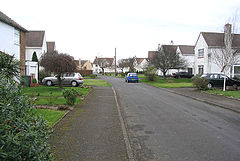Acklington
| Acklington | |
|---|---|
 Acklington |
|
| Acklington shown within Northumberland | |
| Population | 544 (2011) |
| OS grid reference | NU229019 |
| Civil parish |
|
| Unitary authority | |
| Ceremonial county | |
| Region | |
| Country | England |
| Sovereign state | United Kingdom |
| Post town | MORPETH |
| Postcode district | NE65 |
| Dialling code | 01670 |
| Police | Northumbria |
| Fire | Northumberland |
| Ambulance | North East |
| EU Parliament | North East England |
| UK Parliament | |
Acklington is a small village in Northumberland, England. It is situated to the south-west of Amble, inland from the North Sea coast. It is served by Acklington railway station. The name is Anglo-Saxon Old English 'farmstead of Eadlac's people'.
Acklington won the title of Northumberland Village of the Year in 2007. It has a parish church, St John the Divine, and a Church of England primary school.
To the north of Acklington is Morwick Hall a Grade II listed Georgian house. It was built by the Grey family of Howick; in the 1850s it was owned by William Linskill, a former High Sheriff of Northumberland.
A World War II FW3/22 pillbox is located near the B6345.
A dam was constructed on the River Coquet in 1776, causing problems for the river's salmon population. Many years later, the eccentric naturalist Frank Buckland erected a sign directing the salmon to another stream.
Acklington is the home of two prisons: HMP Acklington houses adults, while HMPYOI Castington houses young offenders. The prisons are built on the site of RAF Acklington, a former airfield which opened during World War II. The RAF station was used as an Armament Practice Camp with the aircraft operating over Druridge Bay.
Acklington is served by Acklington railway station which is located on the East Coast Main Line, although in the 2009–2010 timetable the only trains calling at Acklington were one (evening) northbound and two (morning and evening) southbound local services operated on Mondays to Saturdays by Northern.
...
Wikipedia

